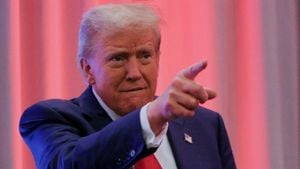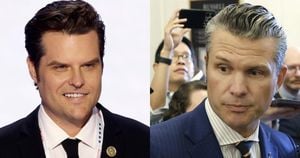Elon Musk, the billionaire behind companies like Tesla and SpaceX, has recently found ways to interject himself more prominently than ever before within government realms and media landscapes, creating waves across the political spectrum. With his colossal following and substantial financial influence, Musk's actions can prompt discussions, incite controversies, and even lead to serious repercussions for individuals working within various governmental frameworks.
This week, Musk sparked outrage by encouraging his followers on X, formerly known as Twitter, to cyberbully Ashley Thomas, who serves as the director of climate diversification at the U.S. International Finance Corporation. Musk's tweet aimed at discrediting her role came after right-wing users criticized her position as being ineffective, dismissively stating, "So many fake jobs." This cynical remark raises eyebrows mainly because Musk himself is among those who profits significantly from government contracts and relationships. It’s tough to ignore the hypocrisy of the situation, where the CEO of multiple global corporations labels government jobs as fake from his tech perch.
Indeed, the stakes have risen higher for federal employees under Musk's lens. Everett Kelley, the president of the American Federation of Government Employees, highlighted the potential for fear this kind of inflammatory rhetoric could sow within the workforce. Kelley insisted Musk’s behavior aims to create anxiety among employees, leading them to self-censor their voices due to fear of backlash. After previously targeting Yoel Roth, who was head of trust and safety on Twitter, Musk's actions serve not only as attacks on individuals but foreshadow broader impacts on governmental operations.
Further complicity arises as Trump has appointed Musk to co-head the Department of Government Efficiency, where he is expected to contribute to controversial budget cuts aimed at slashing government spending by up to $1 trillion. This initiative likely becomes less about fiscal responsibility and more about funneling federal jobs to private companies, including Musk's many ventures. Critics argue this could lead to the privatization of valuable government services, resulting effectively in cashing out public interests for private gains.
Meanwhile, Texas has made its own headlines. The Texas Board of Education has just approved a new curriculum for K–5 students, which permits the instruction of the Bible within public schools, igniting strong reactions over the separation of church and state. The additions are set to provide explicit references to biblical figures and parables at the expense of inclusive education. The optional curriculum affords school districts additional funding to support this program, raising questions over legality and constitutional rights.
Critics argue this move to integrate religious education is not only unconstitutional but potentially harmful to children’s ability to learn about diverse perspectives. Advocates for secular education believe this legislative move emphasizes one religious ideology over others, contravening the foundational American principle of religious freedom.
Texas Governor Greg Abbott has been particularly vocal about supporting the new curriculum, asserting it helps students understand historical contexts of key societal milestones, from the U.S. Constitution to the Civil Rights Movement. But many see Abbott's sentiments as reflective of broader trends within right-wing politics aiming to meld Christian nationalism with public education, particularly as similar bills appear across several states.
Meanwhile, within the political sphere, Donald Trump continues to craft alliances with policy groups like Project 2025, made up of far-right loyalists and conservatives with deep ties to Musk-like ideologies. Despite attempts to dissociate his campaign from this group, Trump's transition team is now utilizing Project 2025’s extensive database to fill government positions with vetted candidates loyal to their shared agenda.
Paul Dans, former director of Project 2025, envisioned creating something akin to "conservative LinkedIns"—a database of MAGA loyalists set to populate the ranks of government. This strategy is emblematic of the radical transformations we might witness under Trump’s next administration, as he doubles down on radical conservatism and aims to complete one of the largest systemic reshuffles of government personnel seen to date.
Such moves are alarming to many who fear the erosion of accountability within government structures. Recently, Trump began nominating individuals tied to Project 2025 for key roles, including Russ Vought for the Office of Management and Budget and Brendan Carr for the Federal Communications Commission. These nominees are not just typical selections; they embody commitments to extreme conservative policies, raising serious concerns about governance moving toward ideological conformity rather than prudent management.
Kelly Loeffler, previously Georgia’s senator, stands as another divisive figure expected to be nominated for Secretary of Agriculture. Loeffler, who has been characterized as one of Trump’s top financial backers, has her own controversial history, including allegations of insider trading linked to the COVID-19 pandemic. Critics included, she remains well-connected with the Trumps’ inner circle, raising eyebrows over possible conflicts of interest should she assume office.
On the geopolitical front, the relationship between Trump and Kim Jong Un seems to have cooled dramatically. Recent statements from the North Korean leader express skepticism about reviving discussions with the U.S. during Trump’s possible second term. Kim hints at political maneuvering within the U.S. as more disruptive than beneficial, clearly marking his disinterest in rekindling diplomatic relations established during Trump's first administration.
All these developments showcase the intertwining of business, government, and right-wing ideologies mania dominating headlines and Twitter feeds. Musk's antics and Trump's endorsements act simultaneously as catalysts for change and sources of contention across different sectors. With stakes higher than ever, the coming months may reveal the full breadth of Musk's influence, as well as the far-reaching consequences of more political appointments aimed at pushing extreme agendas.



